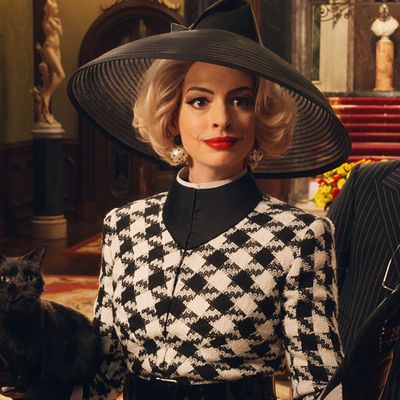
What you need to know about Anne Hathaway’s accent in The Witches is that it cannot be contained by the borders of any one nation — it has been designed to bounce from region to region, often in the space of a single exchange. Sometimes she rolls her r’s with the exaggerated trill of a Spanish teacher doing a demonstration for a class. Sometimes she curls her vowels in a way that lands somewhere between an actual Scandinavian accent and that of the Swedish Chef. Sometimes she leans zestfully into v sounds for w’s, à la your classic German-ish “ve have vays of making you talk” stereotype. When her character, the Grand High Witch, informs the hotel manager played by Stanley Tucci that there should be “no gooourrrrrrlick in the soup,” it defies geography entirely. He asks her to repeat the request. She does, after sneering, “Did I stutter?” He arrives, eventually, at an understanding that she is referring to garlic, but has opted to pronounce the word as though it were a whole phrase unto itself.
The Grand High Witch is alleged to have “hatched on frozen tundras of Norway.” You could argue that this delivery is meant to reflect both that and the existence of a being who’s spent her long, evil life traveling around the world giving orders to various covens hidden in plain sight. But that doesn’t do justice to just how many active choices Hathaway puts into each sentence. Hathaway’s taken a lot of needless, unfair criticism for her theater-kid earnestness in the past, but what she’s doing in this new film from Robert Zemeckis is a performance without ever feeling like acting. Hathaway’s Grand High Witch is scary, because she’s been given a Venom-wide maw and claw-tipped limbs that lengthen themselves like that Street Fighter character. But there’s no center to her, no character — she’s nothing more than a collection of big line readings and out-of-the-box digital effects. Zemeckis can’t channel Hathaway’s energy to any end, because the movie he’s made is so curiously aimless. The Witches is a new version of the 1983 Roald Dahl children’s book, which was previously adapted by Nicolas Roeg in 1990, but it isn’t exactly an update.
Instead, it manages to feel like a project that maybe once had something on its mind, but that was then reworked into something more nebulous. Zemeckis wrote the script with Black-ish creator Kenya Barris and Guillermo del Toro, who has a lot of experience bringing together historical details and genre elements, but only very occasionally do you sense the touch of either. The story’s been transplanted to Alabama, where its unnamed protagonist (played by Jahzir Bruno, and voiced as a grown-up narrator by Chris Rock) goes to live with his grandmother (Octavia Spencer) after his parents are killed in a car crash. But the specificity of the film’s time period — 1968, a moment of huge political action, uprisings, the assassination of Martin Luther King Jr., and the passing of the Civil Rights Act — is so incidental to what happens onscreen as to be mystifying. Mostly, it enables Grandma to dance to the Four Tops’ “Reach Out I’ll Be There” in an attempt to cheer up her grieving grandchild. Grandma, an embodiment of unwavering love and folk-healer wisdom, does gradually succeed in coaxing the main character out of his mourning, just in time for him to have a run-in at the store with a snake-wielding, kid-loathing witch.
The Witches keeps a lot of lore that Dahl, the old anti-Semite, laid out in his novel. But even as it sends Grandma and grandson fleeing to hide out in a fancy hotel by the water, the boy’s pet mouse in tow, it can’t really figure out the mixture of macabre and cozy that Dahl did so well. The witches, who happen to have booked the same hotel for their get-together (under the name of the International Society for the Prevention of Cruelty to Children), are grotesque in a way that’s sure to scar some tender young imaginations, with their unnatural grins and sore-ridden scalps. But they’re mere monsters — they never capture the feeling that Dahl did, and that the Roeg version got close to, of being a child who’s only starting to understand that not all adults are trustworthy. As in the book, the main character is discovered by the witches when he hides out in the hotel ballroom, where he’s been playing with his pet. And as in the book, he’s dosed with the potion the witches are scheming to use on all children, one that transforms him into a mouse. But the adventure that follows doesn’t capture the unapologetically dark giddiness of Dahl, even as it keeps to something close to his original ending. It just feels flat, even in its use of the computer-generated animals it relies on. It’s an adaptation without direction or purpose, with an unwieldy but deeply committed performance at its center. Hathaway looks to be having fun, at least. Someone should!
More Movie Reviews
- The Thriller Drop Is a Perfect Addition to the Bad-First-Date Canon
- The Accountant 2 Can Not Be Taken Seriously
- Another Simple Favor Is So Fun, Until It Gets So Dumb


